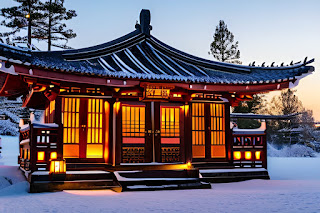Shinto, also known as kami-no-michi, is the indigenous religion of Japan and the belief in and worship of kami, or spirits. The word "Shinto" means "the way of the gods." The origins of Shinto are uncertain, but it is believed to have developed in Japan more than 2,000 years ago.
Shinto beliefs center on the worship of kami, which are spirits or deities that can be found in nature, such as mountains, rivers, and trees, as well as in human ancestors. The kami are believed to have the power to bring good fortune or bring disaster, and thus are honored and revered in Shinto practices.
Shinto has no founder, no official holy text, and no central authority. Instead, it comprises a collection of local practices and beliefs that have evolved over time. It is a polytheistic religion, with a pantheon of kami that includes gods of nature, gods of agriculture, and gods of war.
Shinto practices include rituals such as purification, offerings of food and drink, and ceremonies that mark important life events such as birth, marriage, and death. It also includes festivals, or matsuri, which are celebrated throughout the year and are often associated with the worship of specific kami.
Shinto has been an important part of Japanese culture and society for centuries, and it continues to be practiced by many Japanese people today, often in combination with Buddhism and other religions.
Gods in Shinto
In Shinto, gods or kami are spirits or deities that can be found in nature, such as mountains, rivers, and trees, as well as in human ancestors. They are believed to have the power to bring good fortune or bring disaster, and thus are honored and revered in Shinto practices.
There are many gods or kami in Shinto, and the exact number and names of them can vary depending on the specific tradition or sect of Shinto. Some of the most well-known and important gods in Shinto include:
Amaterasu, the sun goddess and ancestor of the Imperial Family.
Inari, the god of fertility, agriculture, and prosperity.
Susano-o, the god of storms and sea.
Tsukuyomi, the god of the moon.
Raijin, the god of thunder.
Hachiman, the god of war and protector of the nation.
Benzaiten, the goddess of music, eloquence, and good fortune.
Ebisu, the god of fishing and commerce.
Kamado, the goddess of the kitchen and home.
Hoori, the god of fishing and hunting
Izanagi and Izanami, the creator gods who birthed the islands of Japan and many other kami
Shinatsuhiko and Shinatsuhime, the kami of agriculture and food
Sarutahiko, the kami of martial arts and archery
Kunitokotatchi, the god of good health and longevity
Omoikane, the god of wisdom and intelligence
Futsunushi, the god of swords and martial arts
Tengu, the god of martial arts, archery, and yamabushi (mountain ascetics)
This is not an exhaustive list, but it's a good representation of the most known gods in Shinto.




